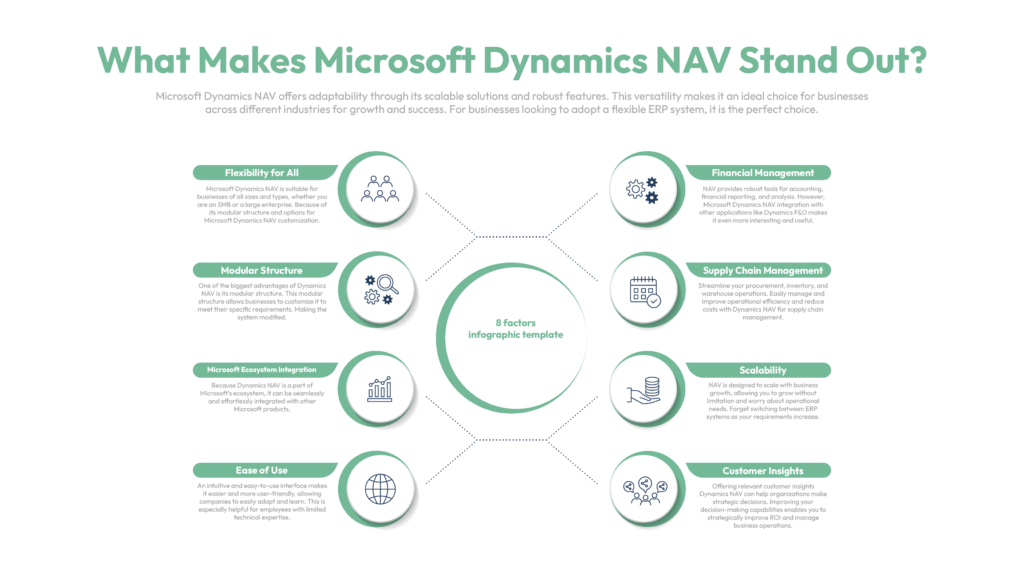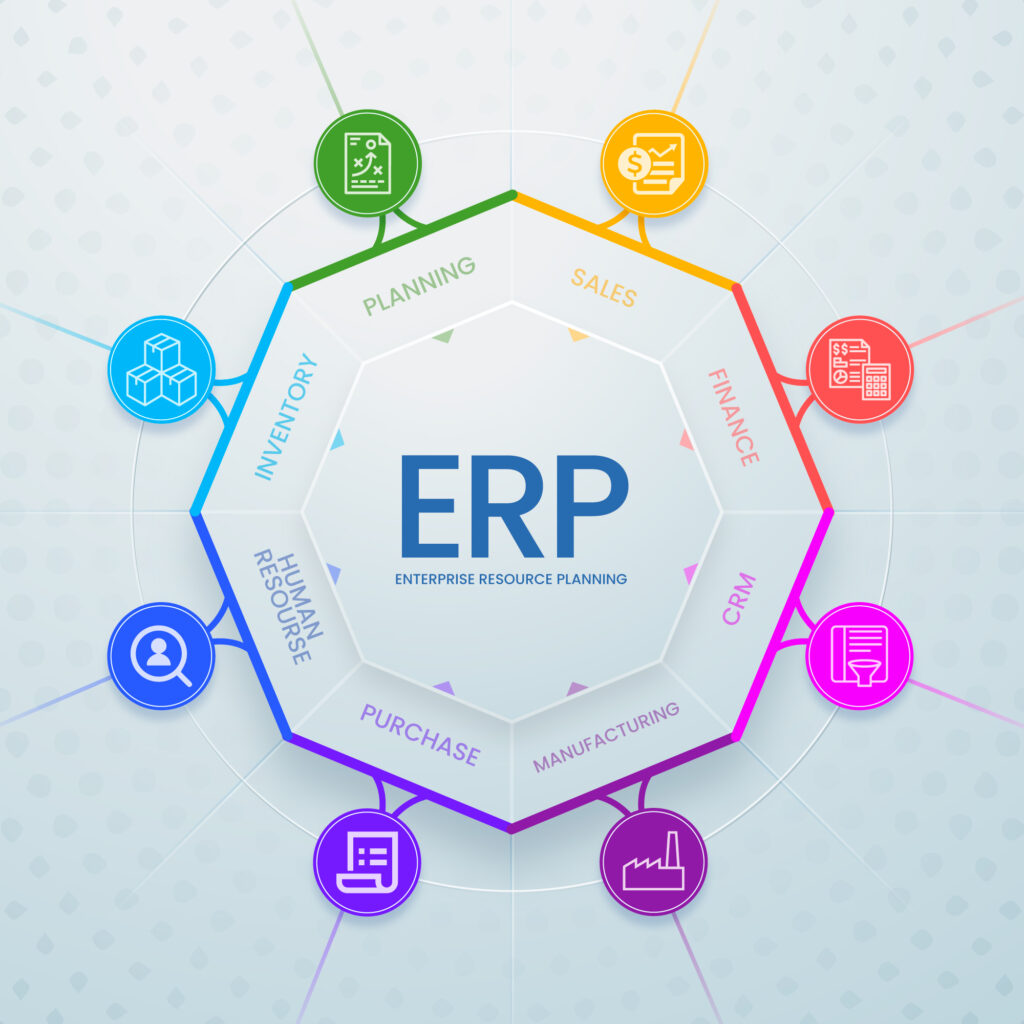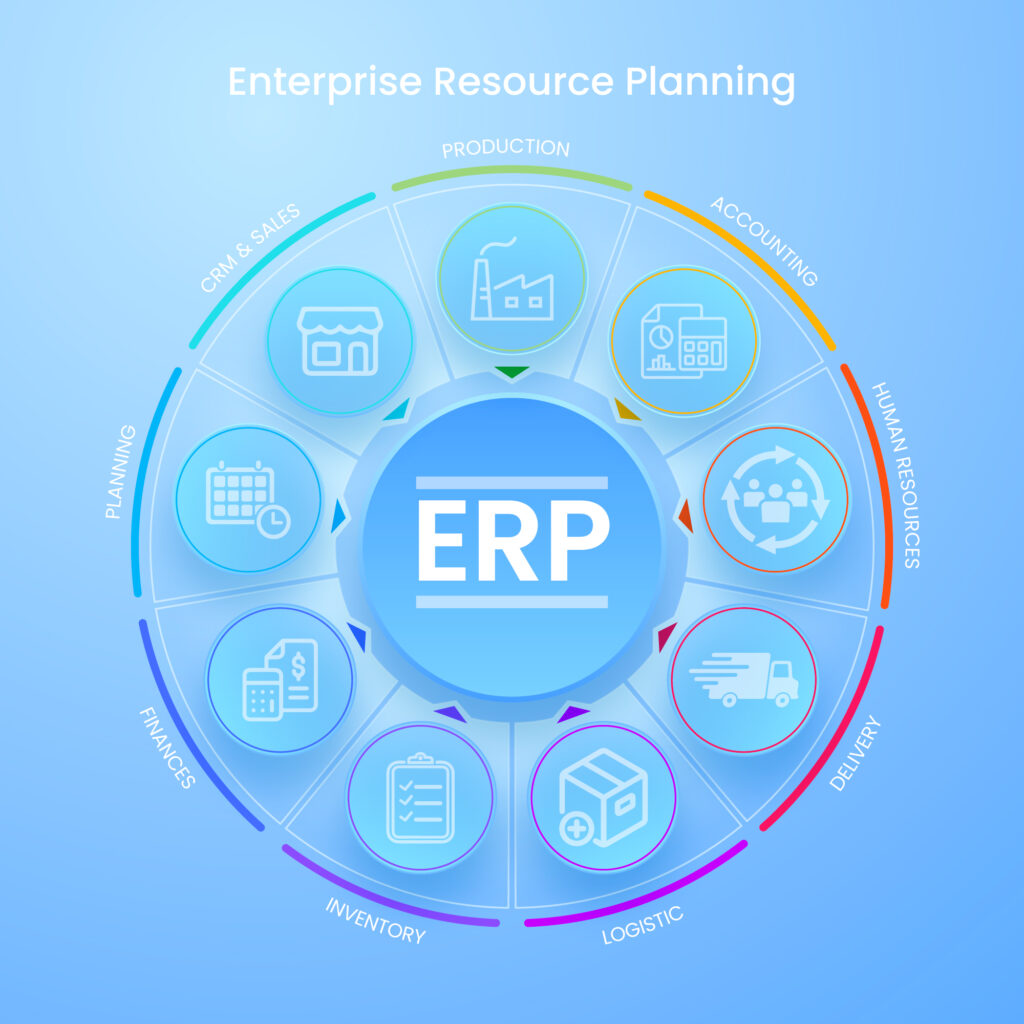Microsoft Dynamics NAV is an ERP system used worldwide for business management. It can handle everything from supply chain to finance and overall operational efficiency. However, customizing the solution according to unique business workflows and requirements remains a challenge. Customizing it improves efficiency, and Microsoft Dynamics NAV integration with other applications ensures smooth data flow according to your requirements.
With growth, businesses face challenges like soiled data, redundancy, and inefficient operations. As businesses grow, bringing challenges to success and scalability, Microsoft Dynamics NAV offers a powerful solution. Equipping businesses with advanced tools, it enables you to lead the way in business transformation. Its cutting-edge features are empowering businesses across different industries.
From utilizing AI features to improving operational efficiency, Dynamics NAV is a complete solution for business growth and success. This blog shows how it is more than just an ERP solution and how it differs from others. We will also look at its benefits and its powerful integrations, which you should consider.
What Makes Microsoft Dynamics NAV Stand Out?
Microsoft Dynamics NAV offers adaptability through its scalable solutions and robust features. This versatility makes it an ideal choice for businesses across different industries for growth and success. For businesses looking to adopt a flexible ERP system, it is the perfect choice. Here are the key features that make it stand out from others.

Flexibility for All
Microsoft Dynamics NAV is suitable for businesses of all sizes and types, whether you are an SMB or a large enterprise. Because of its modular structure and options for Microsoft Dynamics NAV customization, it allows businesses to adopt the features and functionalities they need.
Modular Structure
One of the biggest advantages of Dynamics NAV is its modular structure. This modular structure allows businesses to customize it to meet their specific requirements. Making the system modified without disturbing its core functionalities.
Microsoft Ecosystem Integration
Because Dynamics NAV is a part of Microsoft’s ecosystem, it can be seamlessly and effortlessly integrated with other Microsoft products.
Integrate Office 365, Power BI, and Power Automate to Dynamics 365 Finance and Operations (F&O) for smooth data flow and streamlined business management. This integration happened through methods like API connections, Microsoft Dataverse, etc. The integration runs deep, enabling businesses to automate workflows, analyze data, streamline operations, and much more from a single platform and without relying on third-party solutions.
Ease of Use
An intuitive and easy-to-use interface makes it easier and more user-friendly, allowing companies to easily adapt and learn. This is especially helpful for employees with limited technical expertise, allowing them to understand and fully utilize the platform.
Financial Management
NAV provides robust tools for accounting, financial reporting, and analysis. However, Microsoft Dynamics NAV integration with other applications like Dynamics F&O makes it even more interesting and useful. Helping businesses manage their finances effectively and smartly.
Supply Chain Management
Streamline your procurement, inventory, and warehouse operations. Easily manage and improve operational efficiency and reduce costs with Dynamics NAV for supply chain management.
Scalability
NAV is designed to scale with business growth, allowing you to grow without limitation and worry about operational needs. Forget switching between ERP systems as your requirements increase.
Business Intelligence
Offering real-time insights for business performance, from operational to financial, it has built-in reporting and business intelligence capabilities. Moreover, you can integrate it with Microsoft Power BI for advanced capabilities.
Deployment Options
One of the advantages of choosing Dynamics NAV is that you can choose between on-premise and cloud deployment options. On-premise deployment gives you complete control, while cloud offers the ease of access and automatic updates.
Customer Insights
Offering relevant customer insights Dynamics NAV can help organizations make strategic decisions. Improving your decision-making capabilities enables you to strategically improve ROI and manage business operations.
How Microsoft Dynamics NAV Differs from Other ERP Systems
Many ERP solutions offer similar functionalities, but NAV stands out from the rest in several ways. Here are a few features that set it apart:

Customization & Flexibility
Dynamics NAV is highly customizable and flexible; the biggest advantage is its built-in customization capabilities. Making Microsoft Dynamics NAV customization effortless and so much easier. Configuring workflows, user interfaces, and reporting structures without extensive coding is only possible with NAV.
Scalability and Industry-Specific Adaptability
Dynamics NAV is built to scale with business growth, unlike other ERP solutions. With other ERP solutions, when business requirements change, you would need a complete overhaul or an advanced version. But NAV allows incremental scaling with minimal downtime and disruptions. Moreover, it can be modified to cater to industry-specific challenges, whether you are from the manufacturing, retail, finance, or supply chain industry.
Cloud and On-Premise Deployment Options
Many ERP systems do not offer the option to choose between deployments. Microsoft Dynamics NAV does not limit you to on-premise or cloud deployment; it offers both solutions. It enables businesses to select the model that best suits their operational requirements.
Integration with Microsoft’s Power Platform
NAV can be seamlessly integrated with Microsoft suite applications. Integrate Power BI for advanced reporting, Power Automate for automation, and Power Apps for building custom applications. Such integration gives it an edge over other ERP systems, setting it free from third-party software.
Why Microsoft Dynamics NAV Customization is Essential
Although you would get powerful standard features, customization can increase efficiency and align the solution perfectly with business processes and goals. Here is why you should opt for customization:
Key Benefits of Customizing NAV

1. Improved User Experience
Customizing dashboards for people according to their roles will make it easier to understand and navigate. This improves productivity and adaptability, allowing them to leverage the powerful features.
2. Process Automation
Customization allows organizations to automate repetitive tasks like data entry, inventory tracking, invoicing, reporting, and more. Reducing administrative workload and error chances.
3. Industry-Specific Solutions
Industries have different needs, so customization will allow them to create and adopt modules tailored for their specific needs.
4. Reporting and Analytics
Microsoft Dynamics NAV customization enables custom report creation for better understanding, deeper insights, and performance overview. So now you can understand the position of sales, inventory, and finances with just a click.
5. Increased Data Accuracy
Eliminating manual data entry with automation improves accuracy with validation rules and reduces errors for enhanced reliability.
6. Scalability and Adaptability
Customization and custom features enable it to evolve with business growth without software changes or complete renewal, making it highly scalable and adaptable.
7. Integration with Third-Party Applications
Apart from integration with Microsoft applications, you can also integrate it with custom APIs. Such integration allows for smooth communication between NAV and external applications like e-commerce platforms and payment gateways.
8. Compliance and Security Enhancements
Customization can improve security and make it easier to implement security features like role-based access and compliance with industry-specific regulations.
The Power of Microsoft Dynamics NAV Integrations
Integrating Microsoft Dynamics NAV with other applications will improve data flow, remove data repetition, and improve operational efficiency. The following are the most common integrations:
CRM: Dynamics 365 CRM or Salesforce
The CRM integration option is between Dynamics 365 and Salesforce. This enables businesses to work with synchronized data for sales, marketing campaigns, and customers. Hence, a unified system and complete view of data improve decision-making.
E-commerce: Shopify, Magento, Amazon, eBay
Integrating e-commerce platforms enables you to sync inventory, pricing, and order fulfillment with Dynamics NAV and your online stores. This reduces manual entry, minimizes errors, and improves productivity.
Payment Gateway: PayPal, Stripe, Square
Payment gateway integration is essential to ensure smooth, secure, and automated payment processing. NAV’s financial module offers a better customer experience and data control.
Logistics & Supply Chain: FedEx, UPS, WMS
To improve inventory tracking, shipping automation, and real-time order status, businesses should integrate logistics and supply chain applications like FedEx, UPS, and WMS.
Business Intelligence: Power BI, Jet Reports
Integrating business intelligence software will improve your reporting capabilities by connecting NAV to data visualization and analytics tools.
HR & Payroll: ADP, BambooHR
HR system integration with Microsoft Dynamics NAV will streamline and simplify employee management, payroll processing, and compliance tracking.
Choosing the Right NAV Consulting Partner for Customization & Integrations
Choosing the right partner has perks like getting customized Microsoft Dynamics NAV consulting, customization, and integration strategies. All these tasks require experience and certified expertise. That is why you need to find the right partner who understands your industry needs, has a proven track record, and offers post-deployment support, training, and optimization.
How DS Service Can Help
Dynamics Solutions offers specialized services tailored for perfect NAV customization and integration. Our certified consultants and developers ensure that maximum ROI is returned. Our team provides enhancements and long-term support for continuous success.





